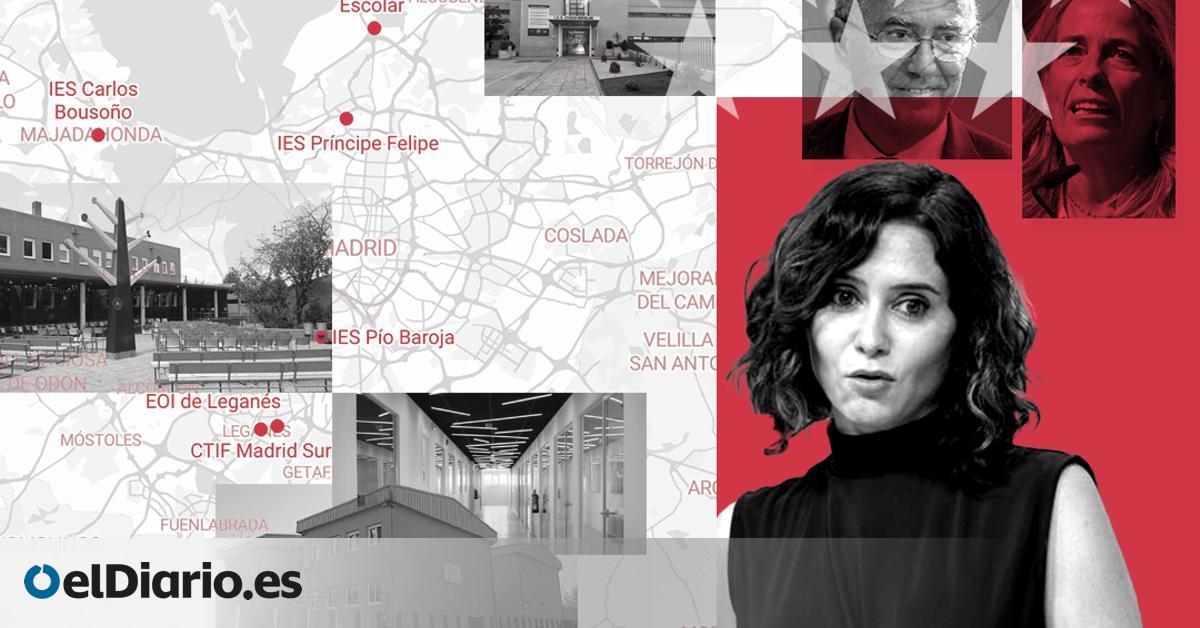
The Education Department of the Madrid Government, chaired by Isabel Díaz Ayuso, carried out comprehensive reforms in at least five other educational centers, some of them secondary schools, and outside the law, in addition to the two revealed by elDiario.es, one of which is being investigated by the Prosecutor’s Office for signs of corruption.
Although the department headed by Emilio Viciana since 2023 does not officially admit to more cases and does not answer any of the questions asked, this media has been able to prove works worth hundreds of thousands of euros that were broken down into invoices of less than 40,000 euros plus VAT so that they would pass for a minor contract and avoid all the economic controls and the Intervention of the Community of Madrid that are activated in large works (greater than those 40,000 euros). Builders, public photos and staff of the centres have confirmed that the reforms were carried out and that they were not put out to tender, as required by law. It is the same crime for which the leader of Junts Laura Borràs was sentenced to four years in prison for prevarication, in her case for amounts ten times smaller than in the case that haunts the Ayuso Government.
With these five cases, there are now seven in the region, although it is not ruled out that there may be many more, according to sources consulted and familiar with the scandal. In principle, the Ministry blamed it on a deputy director of FP who was suddenly dismissed in March, although as data is revealed, it is proven that the illegal system is not limited to an administrative area (the educational management of the Ayuso Government is divided into Territorial Area Directorates – DAT -, each of which has a head). It already affects centres in the Central, East, South and West areas and is not limited to FP or Special Regime such as Language or Art Schools (the competence of the dismissed deputy director), but also affects a teacher training centre, dependent on another department. In addition, at least two different construction companies received the orders with precise instructions from personnel assigned to the Ministry of Education on how to do the work and charge.
12 minor bills for a single renovation
As elDiario.es has been able to confirm with documentation, one of the centres that split contracts is the Príncipe Felipe secondary school (IES), which teaches vocational training and also high school in the Fuencarral-El Pardo district. This institute attached to the DAT Centro carried out a major reform in 2022, budgeted at 230,000 euros. The entire ground floor, the library, the management offices were remodelled and an entrepreneurship classroom was created, a type of classroom that is a commitment of the Ayuso Government and which aims to promote job creation. They are financed with European funds.
Although the law required that this work be put out to public tender, given that it exceeded the 40,000 Euro limit set by the Public Sector Contracts Act, the Infrastructure Department of the Regional Ministry did not open any file or hold a public tender, which would have ensured competition and economic oversight. A contracting committee with technicians and specialists would have chosen the best offer for the interests of the citizens and the process would have been made public.
All of this was ignored and a company was handpicked to submit a budget. To pay it, the Ministry of Education established a modus operandi that ensured opacity and avoided controls: the total amount was divided into 12 invoices of less than 40,000 euros and was paid from the centre’s own account to different subsidiaries of the same business group so as not to raise suspicions. In other cases of renovations, the payments came from several public centres so that the amounts would not raise alarms, something that was organised by the Ministry.
This is the operation that was carried out a year earlier in the Ciudad Escolar macro-complex that the Public Prosecutor’s Office is investigating, after the Ministry itself saw signs of a crime following complaints of non-payment by the builder who built a teaching hospital there. There, up to 700,000 public euros were paid for a work done with a budget of 2.5 million euros that has remained unpaid and abandoned. The Ministry pointed out in its letter to the deputy director of FP Alfonso Mateo and two directors of FP, from whose centers the money came. However, none of them had the capacity to set up a center of these characteristics without technical help from other Education departments. The same happened in the case of the Alcalá School of Art, which the Ministry claims to be investigating and which has not been taken to the Public Prosecutor’s Office, despite the fact that it involved a disbursement of 1.2 million public euros with contract splitting, as elDiario.es was able to verify and published.
A language school and teacher training centre
Two other similar cases in which the same modus operandi was used are the Leganés Language School and the Centro Territorial de Innovación y Formación Sur (Cetif) in Leganés – which provides training to teachers and depends on the Innovation sub-directorate. According to what elDiario.es has been able to confirm, in writing and graphically, floors and walls were completely renovated, partitions were demolished and raised and bathrooms were renovated. The work clearly cost more than 40,000 euros and, in this case, in the DAT Sur.

Sources from the construction company that was in charge of both renovations confirm that they did not submit a tender because no tender was put out. The Education Department asked them for a quote, which was accepted and the roofs, electricity, floors, platforms and classrooms were built. They have not revealed the total cost nor have they wanted to give more details.
elDiario.es has been able to confirm with reliable sources from Cetif and the Language School itself that the works were carried out completely and in one go in the same year, in 2021, which is why it is evident that invoices were split up in order to be able to pay, since if there was no public tender – and neither of the two are recorded in the Madrid Contracting Portal – the only way to pay outside the radar of the Intervention and the Inspection is with the centers’ own funds, in different payments, as was ordered to be done in the case of Ciudad Escolar and in the case of the Alcalá Art School.

Exactly the same thing was done at the IES Carlos Bousoño in Majadahonda (DAT Oeste) to pay the more than 100,000 euros that it cost to build a multidisciplinary classroom, a technology classroom, the teachers’ department and the bathrooms on the upper floor. This work was carried out in 2022 and smaller invoices were drawn up to be able to pay, since it was not put out to public tender, as elDiario.es has also been able to confirm with sources from the centre. Or the improvements at the IES Pío Baroja (DAT Sur), of a lower amount (59,000 euros) but which were also not put out to tender despite exceeding by 20,000 euros the limit set by law for making a minor contract.

In addition to the confirmation that minor contracts were also used in these five centres, elDiario.es has been able to confirm that many of these documents are not even posted on the Madrid Contracting Portal, the place where all minor contracts and also the works tendered should be published. Invoices that were paid are missing and in other cases the name of the centre is not specified. Education does not answer why these contracts cannot be found or about these new works revealed by elDiario.es.
Sources familiar with the case agree that it is not plausible that a deputy director dependent on Educational Policy and the directors of the institute (who are teachers with a position) would have put together these multi-million-euro works and reforms alone. In the case of Alcalá, the works were known to both the Infrastructure department – which requested the plans and the project from the businessman – and the person in charge of the eastern area (the so-called Territorial Area Directorate, DAT). This was Jorge De la Peña, number two of the PP in Alcalá and today general director of concerted education. This senior Ayuso official not only knew about the work, but also visited it in person, requested some modifications to its air conditioning and exchanged emails with the builder.
At the time of these works in the five new centres revealed (2021 and 2022), the Education Minister was Enrique Ossorio, today president of the Madrid Assembly. His number two was the Deputy Minister of Education Policy, Rocío Albert López-Ibor, a heavyweight of the PP, close to Faes and today Ayuso’s Minister of Economy and Finance, a central position in the regional government. In charge of the infrastructure was Nadia Álvarez in 2021 (today a councillor in the Madrid City Council), who was replaced by Manuel Bautista in July 2022. Bautista is the current mayor of Móstoles and Ayuso’s support in the hard core of the PP in Madrid.
Where did the money come from to pay for all these works and renovations? From the accounts of the institutes themselves, which receive both ordinary operating income and extraordinary income (European funds, Next Generation, the Ministry of Education…). The centres have financial autonomy and it is the directors and management teams who can decide and spend the money (as long as it is a minor contract) with the corresponding invoice and record. In some cases accredited by elDiario.es, the dismissed former deputy director (on someone else’s orders or not) ordered payments even to external centres that had nothing to do with the work in order to ensure that the invoices were not recurrent and to avoid setting off alarms.
You can send confidential information or documents to the editorial office by email: [email protected]
Source: www.eldiario.es

